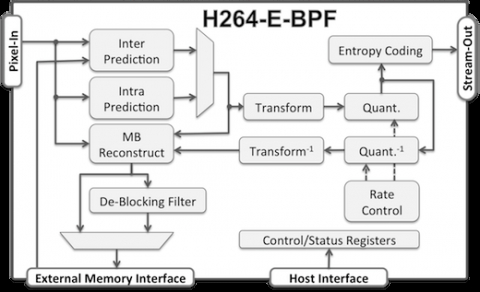Ultra-Fast AVC/H.264 Baseline Profile Encoder Core
The H264-E-BPF encoder requires less silicon area than most equally capable hardware H.264 encoders—approximately 250K gates—allowing for very cost-effective implementations. Its small silicon footprint, low external memory bandwidth requirements, and zero software overhead enable high-throughput H.264 coding at an extremely low energy cost. The encoder is able to process UHD/4K video when mapped on modern ASIC technologies, and Full-HD when mapped on FPGAs.
Despite being small, the H264-E-BPF produces high-quality video, especially at low bit rates, and is suitable for systems with low latency requirements. It uses constant quantization to output video streams of Variable Bit-Rate (VBR), or automatically regulates quantization multiple times within a frame to output Constant Bit-Rate (CBR) streams. In CBR mode it responds rapidly to temporal or spatial changes in the video content. This can be combined with an artifacts-free Intra-Refresh coding implementation to effectively eliminate bit rate peaks, while preserving the periodic intra-coded references. As a result, the stream buffers can be smaller than those typically required, and the end-to-end latency can be brought down to frame or sub-frame levels. Video quality at low-bit rates is preserved, as the encoder intelligently uses block-skipping and quantization coefficient thresholding to reduce bit rate at minimal quality loss, and uses the in-loop deblocking filter to eliminate the blocking artifact.
The core was designed for ease of use and integration. Once initially programmed, it operates without any assistance from the host processor. The encoder’s memory interface is extremely flexible: it operates on a separate clock domain, is independent from the external memory type and memory controller, and is tolerant to large latencies. The core is optionally delivered with a raster-to-block converter, and wrappers for AMBA® AHB, AXI, or AXI-Streaming buses are available.
Customers can further decrease their time to market by using CAST’s integration services to receive complete video encoding subsystems. These integrate the encoder core with video and networking interface controllers, networking stacks, or other CAST or third-party IP cores.
The H264-E-BPF IP core is designed using with industry best practices and has been production proven multiple times. Its deliverables include a complete verification environment and a bit-accurate software model.
查看 Ultra-Fast AVC/H.264 Baseline Profile Encoder Core 详细介绍:
- 查看 Ultra-Fast AVC/H.264 Baseline Profile Encoder Core 完整数据手册
- 联系 Ultra-Fast AVC/H.264 Baseline Profile Encoder Core 供应商
Block Diagram of the Ultra-Fast AVC/H.264 Baseline Profile Encoder Core




